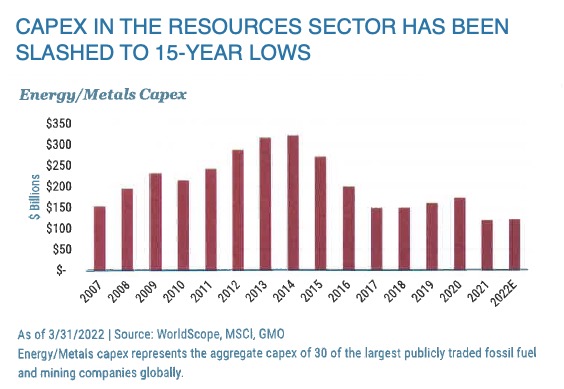CHART: Big oil, mining on capex strike
Capital expenditure by large oil and mining companies is down to a 15-year low despite a 40% rise in global commodity consumption over the same period, according to a new report.
Investment firm GMO in its quarterly publication takes a look at how investors can protect themselves from inflation by investing in natural resource stocks, which, according to the report, remain fundamentally undervalued.
Lucas White, portfolio manager for Resources and Climate Change Strategies at the Boston-based company, says it is “somewhat stunning” that despite the fact that the world consumes around 40% more of many major commodities like natural gas, iron ore and copper than it did 15 years ago, resource companies have slashed investment in new production.

White points out that the Bloomberg commodity index is up 500% since 2000, adding that “it’s hard to imagine any plausible explanation for such a dramatic surge in commodity prices that doesn’t include a healthy dose of scarcity”:
“Underinvestment in supply in recent years will impact production for at least the next decade. Over most of the last decade, commodity prices have been falling or low. Commodity producers, reacting to low prices and criticism that they had overinvested during the China-driven commodity supercycle, slashed capex significantly.
“Pressure from ESG/sustainability circles and divestment campaigns also sought to starve fossil fuel companies of capital.
“Then, covid hit, and resource companies cut capex again. Furthermore, the capital intensity of commodity production has also risen substantially in recent decades as we’ve moved from higher- to lower-quality assets.
“In short, current capex levels are totally insufficient if we are to meet growing global demand.”
{{ commodity.name }}
{{ post.title }}
{{ post.date }}




3 Comments
Balter
Curtailment more like: institutionalized Marxism using indigenous proxies and indoctrination of schoolchildren with climate alarm; groceries come from a grocery store, fuel comes from a fuel station. And we keep electing them. In fact I’d go so far as to say any rational candidate will be weeded out, shut down and suppressed. I say Marxism but really it’s silver spoon socialism: the people funding these activities are very wealthy and the price of bread is not a concern for them. For a thousand years they have been setting aside Royal Forests where peasants who trespassed might be imprisoned, tortured and executed. The modern version with rangers and wardens no longer has its own court system but the intent is the same.
Millstone
And when the shortages arrive, “It’s those greedy capitalists!”
Oredigr
Just wondering if some if this may be planned on purpose. Car manufacturers learned a long time ago they have a higher margin for premium cars so now it is hard to find a “regular” car. Copper mining companies learned in the early 2000’s that if they curtail production the price will rise and the margin on a per pound basis is better. Chinese supercycle notwithstanding. Why invest in more and more production when a limited production will produce a higher margin? The only way this works is if everyone agrees to curtail production and then the sector benefits. This is probably way oversimplified but there may be something to making less of a product for a higher overall margin. I am no economist but I am sure someone out there has already considered this. Whether intentional or not, reducing capital investment to increase margins by limiting output could be a factor.